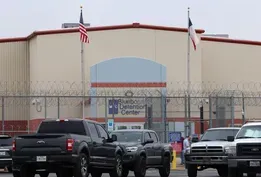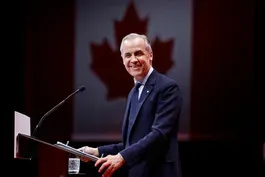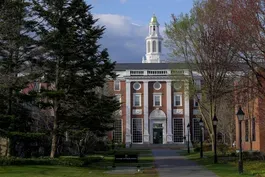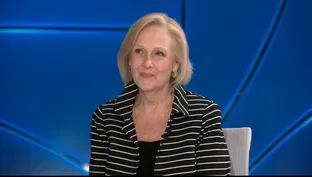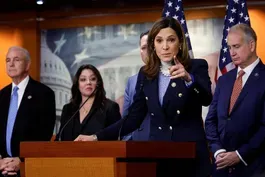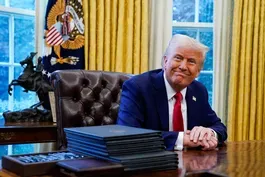
Why Trump softened some tariffs on automotive industry
Clip: 4/29/2025 | 5m 59sVideo has Closed Captions
Why Trump softened some of his tariffs on the automotive industry
President Trump signed an executive order aimed at softening the blow his tariffs have imposed on the automotive industry and U.S. manufacturers. But tensions with China remain high and China’s Ministry of Foreign Affairs issued a video saying it would not back down from the trade war with the U.S. Geoff Bennett discussed more with Gavin Bade of The Wall Street Journal.
Problems with Closed Captions? Closed Captioning Feedback
Problems with Closed Captions? Closed Captioning Feedback
Major corporate funding for the PBS News Hour is provided by BDO, BNSF, Consumer Cellular, American Cruise Lines, and Raymond James. Funding for the PBS NewsHour Weekend is provided by...

Why Trump softened some tariffs on automotive industry
Clip: 4/29/2025 | 5m 59sVideo has Closed Captions
President Trump signed an executive order aimed at softening the blow his tariffs have imposed on the automotive industry and U.S. manufacturers. But tensions with China remain high and China’s Ministry of Foreign Affairs issued a video saying it would not back down from the trade war with the U.S. Geoff Bennett discussed more with Gavin Bade of The Wall Street Journal.
Problems with Closed Captions? Closed Captioning Feedback
How to Watch PBS News Hour
PBS News Hour is available to stream on pbs.org and the free PBS App, available on iPhone, Apple TV, Android TV, Android smartphones, Amazon Fire TV, Amazon Fire Tablet, Roku, Samsung Smart TV, and Vizio.
Providing Support for PBS.org
Learn Moreabout PBS online sponsorshipAMNA NAWAZ: Welcome to the "News Hour."
President Trump signed an executive order today aimed at softening the blow his tariffs have imposed on the automotive industry and U.S. manufacturers.
A tariff of 25 percent on imported cars and auto parts will remain in place, but the administration will make some changes so differing tariffs can't be stacked on top of other tariffs for automakers.
GEOFF BENNETT: Beyond that, automakers will be reimbursed for some of the costs of imported parts.
That news came as President Trump marked his first 100 days in office.
Just before he left for a trip to Michigan today, he explained why he adjusted the levies for carmakers.
DONALD TRUMP, President of the United States: We just wanted to help them endure this little transition short term.
And during this little -- if they can't get parts, it has to do with a very small percentage.
If they can't get parts, we didn't want to penalize them.
GEOFF BENNETT: But tensions with China and a number of countries remain high and companies are concerned.
For its part, China's Ministry of Foreign Affairs issued a video today saying it would not back down from the trade war with the U.S. NARRATOR: History has proven compromise won't earn you mercy.
Kneeling only invites more bullying.
China won't kneel down, because we know standing up for ourselves keeps the possibility of cooperation alive.
GEOFF BENNETT: For more on all this, we're joined now by Gavin Bade, trade and economic policy reporter for The Wall Street Journal, who first reported on the story.
It's great to have you here.
Thanks for coming in.
GAVIN BADE, Trade and Economic Policy Reporter, The Wall Street Journal: Thanks for having me back.
Glad to be here.
GEOFF BENNETT: So help us understand more about the exemptions the president announced today.
How big of a break is this for automakers, especially when the broader 25 percent tariffs on imported parts and cars remains in effect?
GAVIN BADE: Yes, I think the impact is still a little bit uncertain.
The automakers I talked to are still digesting it, but it's significant that we're not going to see, for instance, the 25 percent steel and aluminum tariffs, that they were going to be stacked on top of these 25 percent auto tariffs before this action today.
That was going to be really painful for a lot of automakers, not just for finished cars, but for the parts they're bringing in from other countries.
Then we will also see a small rebate for these automakers on the tariffs they will pay on a these parts coming in, so giving them a little bit of the breathing room to hopefully reconfigure their supply chains to have more U.S. supply in their cars.
GEOFF BENNETT: People can be forgiven if they're confused by all of this.
It's a lot to track.
What does this mean for people who are in the market to buy a car?
GAVIN BADE: I think it means that, while we will still see some significant price increases this year in automobiles, it will not be quite as steep as it might have been.
I think this means that automakers will be able to continue constructing cars in the United States using some of their foreign suppliers while they try to find new ones here in the United States.
GEOFF BENNETT: There was also this interesting wrinkle today, this dust-up between Amazon and the White House.
There was reporting that Amazon considered letting its discount platform display the cost of tariffs next to the total cost of a product.
The White House called that a hostile and political act.
President Trump called Amazon founder Jeff Bezos to personally complain about it.
Amazon backed away from it, withdrew this idea.
Tell us more about this.
GAVIN BADE: Yes, I think this just really demonstrates the swirling political controversy around these tariffs and how sensitive the White House is.
They really took this as a poke in the eye this morning.
You could hear the emotion in Karoline Leavitt's voice at the briefing when I was there this morning, calling this a hostile political act.
And they are really on the lookout for anyone who's trying to critique their trade policy from the corporate world.
I think that's why you see very few companies such as these automakers come out and directly criticize these tariffs.
I mean, these were a very big crisis for the automakers.
You didn't see them do something like this, I think, because they were looking to not get a reaction like Amazon got this morning.
GEOFF BENNETT: And still they're concerned about their bottom line.
We saw GM say today it needs to reassess what tariffs mean for their earnings.
Other companies have made similar statements in recent weeks too.
GAVIN BADE: Yes, I think over 40 companies at our last count have either revised or pulled back on their earnings statements just because of the economic uncertainty.
And in the auto sector, what I'm really interested to look at is how this is going to affect the auto parts suppliers not just in other countries, but in the U.S.
They were hoping for a break from these tariffs as well, but it's only the auto manufacturers who got it.
So I think there's still going to be some pressure on them and we might see some closures if they can't find out another way around these tariffs.
GEOFF BENNETT: So President Trump is trying to recalibrate as it's clear his tariff plan is a drag on the markets, on consumer confidence and beyond.
China, though, as we saw in that clip we played, they're not backing away.
They're not easing up.
GAVIN BADE: They're certainly driving a very hard bargain.
And they -- the Chinese have been steadfast in saying there are no significant trade conversations going on right now with the Trump administration.
Every time they do that, the Trump administration comes back and says, no, no, no, we're talking, we're talking at multiple levels.
So it's kind of like, who do you trust or distrust more at this point?
What I think is clear is that, if there is going to be a trade deal with China, it's not going to be tomorrow, it's probably not going to be next week.
There's going to have to be a lot of hashing out to do.
The question is that can we get to a deal with them before the supply chain convolution starts to hit this summer?
GEOFF BENNETT: Based on your reporting, how closely is the White House reading the public mood and trying to respond to it?
GAVIN BADE: They put on a strong face and say that we are very -- we're steadfast in our tariff approach here, but I think you see them being sensitive not only to the public, but also to the stock and bond markets with all of these walk-backs that they have done in the past few weeks.
GEOFF BENNETT: Gavin Bade covers trade and economic policy for The Wall Street Journal.
Always a pleasure, my friend.
Good to see you.
GAVIN BADE: Thank you, sir.
Analyzing Trump's immigration agenda in his first 100 days
Video has Closed Captions
Clip: 4/29/2025 | 6m 6s | Analyzing Trump's actions on immigration during his first 100 days (6m 6s)
How Mark Carney led Canada's Liberal Party to election win
Video has Closed Captions
Clip: 4/29/2025 | 10m 4s | How Mark Carney led Canada's Liberal Party to an election win (10m 4s)
News Wrap: Harvard to review academic offerings and policies
Video has Closed Captions
Clip: 4/29/2025 | 6m 33s | News Wrap: Harvard announces review after antisemitism and Islamophobia reports (6m 33s)
PBS CEO on the impact of cutting public media funding
Video has Closed Captions
Clip: 4/29/2025 | 8m 29s | PBS CEO weighs in on the potential impact of cutting public media funding (8m 29s)
Salazar pushes citizenship path for undocumented migrants
Video has Closed Captions
Clip: 4/29/2025 | 9m 2s | GOP Rep. Salazar calls for pathway to citizenship for some undocumented immigrants (9m 2s)
Where Trump's approval rating stands after 100 days
Video has Closed Captions
Clip: 4/29/2025 | 5m 45s | Where Trump's approval rating stands after 100 days in office (5m 45s)
Providing Support for PBS.org
Learn Moreabout PBS online sponsorshipSupport for PBS provided by:
Major corporate funding for the PBS News Hour is provided by BDO, BNSF, Consumer Cellular, American Cruise Lines, and Raymond James. Funding for the PBS NewsHour Weekend is provided by...
